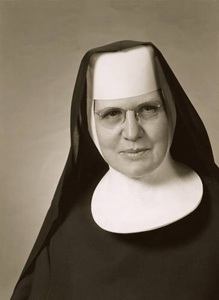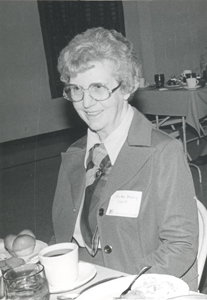 Home
Home
Sister Mary Grell
Sister Mary Grell; left: undated, center: September 1968, right: undated. (click thumbnails for larger images)
Sister Mary Grell, OSB was the seventh president of the College of Saint Benedict. She served a five year term from 1963-1968. During her term, S. Mary dedicated the Benedicta Arts Center, enacted the 4-1-4 academic program, oversaw the inclusion of lay individuals on CSB’s Board of Trustees, and initiated a cooperative program with Saint John’s University.
S. Mary obtained her Bachelor’s degree from the College of Saint Benedict, her Master’s degree from St. Louis University, and her doctorate from Fordham University, where she specialized in cytogenetics. She was a Fulbright Scholar in 1954-1955 and researched at the Max Planck Research Institute in Germany. S. Mary also studied at several other schools, including the University of Minnesota, Columbia University, Colorado State University, Gonzaga University, and the Marine Biological Laboratories in Woods Hole, Massachusetts.
S. Mary began teaching at CSB in 1933, and was a professor of biology and the chairman of the Biology Department. In 1959, S. Mary taught a television credit course in genetics over KCTA-TV. She was also a member of the Tri-College Research Team and worked on the “Understanding Asia” project from 1960 to 1961.
In 1963, S. Mary was appointed as the seventh president of the College of St. Benedict. Many exciting and significant changes for CSB occurred during her term in office. The Benedicta Arts Center was completed in 1963; encouraging the growth and development of the fine arts departments, it was a new state-of-the-art venue that attracted groups like the Minneapolis Symphony Orchestra and the United States Marine Band to the Central Minnesota community. Plans were made to research and establish a cooperative relationship between CSB and SJU. The first phase was to begin an initial exchange program with faculty and students at both institutions as well as the joint use of library, food, and bus services; the first phase was completed by 1967. The second phase was the implementation of a combined curriculum and single calendar for both colleges, led to the development of the 4-1-4 academic program which was implemented during the 1967-1968 academic year. The academic year would be composed of two semesters each fifteen week long; during semesters, students would take four courses. In between semesters there would a one month interim, known as January or J-Term. During this interim month, students could focus on one course, do independent study, travel, or do field work. In addition to instituting a common curriculum and schedule, both schools would have cooperative Admissions offices and work toward a more effective use of faculty as well as eliminate areas of duplication in academic departments. The third and final phase would focus on cooperation on the administrative levels at CSB and SJU.
S. Mary resigned her presidential position in 1968 and returned to teach in the Biology Department. In 1979 she was elected regional superior at Manchester Priory, New Hampshire. Upon discovery of cancer, she returned to St. Benedict’s in October 1980. S. Mary died on April 9, 1981 at the age of sixty-nine and in the forty-ninth year of her religious profession. The Sister Mary Grell Teacher of Distinction Award was named in her honor.
For more on Sister Mary Grell:
- Sister Mary Grell Teacher of Distinction Award recipients.
- “Benedicta Arts Center plays a part at CSB starting in 1963,” The Record, October 30, 2003, p. 4.
- Mattern, Patty. “A Concrete Commitment to Science,” Saint Benedict’s Today, Spring 1988, p. 2-5.
- “Sister Mary Grell Obituary,” CSB Archives Sister’s List.
- “Former CSB president named superior of priory in New Hampshire,” St. Benedict’s Today, September 1979, p. 3.
- “Focus on the Biology Department,” Saint Benedict’s Today, April 1977, p. 1.
- “Liberation not new to Sr. Mary Grell,” The Vitae, October 24, 1974, p. 2.
- “Sister Mary Resigns Her Post,” The Torch, April 26, 1968, p. 1.
- “Hill Foundation Gives $40, 200 To CSB, SJU,” The Torch, November 6, 1967, p. 1, 4.
- “Faculty Approves 4-1-4 Study; Considers Courses, Calendar,” The Torch, December 2, 1966, p. 3.
- “5 New Trustees Named at CSB,” The Torch, December 2, 1966, p. 4.
- “Sr. Mary Opens School Year; Makes Appeal for Scholarship,” The Torch, October 1, 1965, p. 1.
- “Announcement of new president,” The Benet, October 1963, p. 9.
- “Profs in Europe, Asia For Tri-College Study,” The Torch, June 24, 1960, p. 1.
- “Biology Prof Receives Honor,” The Benet, April 1958, p. 1.
Special thanks to Megan Girgen ’13 and Meghan Flannery ’15 for drafting this text.


